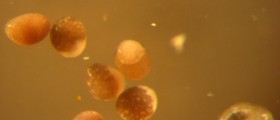
Prospective donors apply to an egg donation program, and then, if they seem like potential candidates, they are interviewed and given medical psychological exams. If the prospective egg donor is found to be still suitable, then parents seeking a donor with similar characteristics and a surrogate mother are found. When an adoptive couple and surrogate mother are identified, usually about two months after the initial approval, then the egg donor is given Lupron and follicle stimulating hormone injections to encourage the "ripening" of 8 to 15 eggs.
Daily trips to the egg donation center are required for up to two weeks for Lupron administration and monitoring, but the donor gives herself injections of follicle stimulating hormone at home twice a day for the next 12 days to two weeks. After nearly a month, the prospective egg donor gives herself the "trigger shot" of hCG at home, and then about 34 hours later she reports to the egg donation center to have her eggs collected. She is given a sedative during the procedure, and most women remember nothing about having their eggs collected.
Although complications are not unheard of, women typically go back to their normal schedule the day after donating their eggs. Most of the time, substantial compensation is available for women who do egg donation. Where the procedure in California is a little different is the state requirement that all six parties to egg donation agree on the parental rights of those involved in the conception of the child. There must be an explicit, written agreement signed by the egg donor and her spouse (if any), the surrogate mother and her spouse (if any), and the adoptive parents. If two women have legitimate claims to being biological mothers of the child, then the intent of the agreement they signed determines their future rights in court.

















Your thoughts on this
Loading...